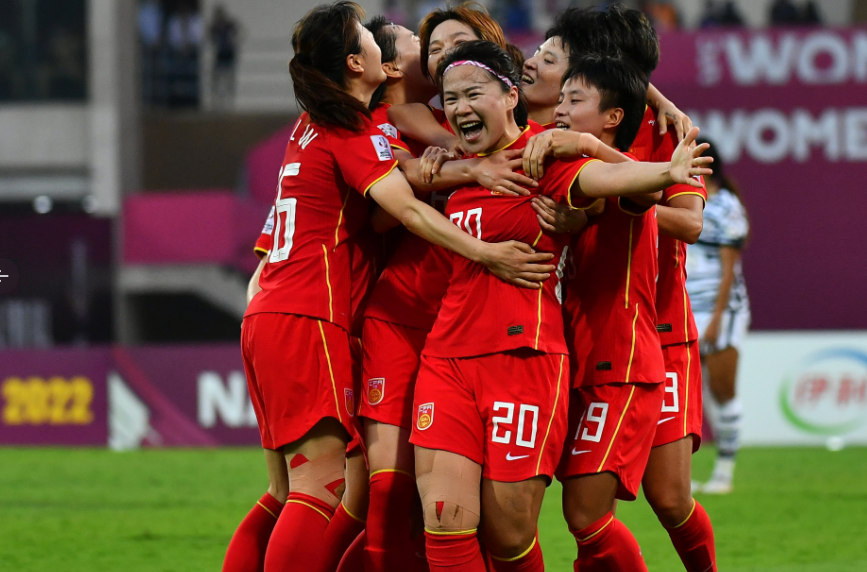Vocal for Local: How China Always Had an Advantage Over South Korea at AFC Women’s Asian Cup Final

China women’s national team players celebrate after beating South Korea in the final of the AFC Women’s Asian Cup on Sunday.
“We lost control,” Colin Bell admitted in the post match press conference — an eerie occasion where, despite the digital platform providing remoteness, a sense of gloom prevailed. And they had. For 67 minutes they had it, and if they had pressed the button marked ‘cruise’ they’d have been justified, because that’s how dominant they’d been. Two goals up, Ji So-yun in full flow, victory guaranteed, South Korea’s English manager could’ve been forgiven for thinking about the beers to follow after. He may even have been thinking about the Africa Cup of Nations, wondering if Senegal, the best footballing country to never win the continental title, would emulate his Korean women’s team — the best footballing team to never win a continental title; underachievers to a point that this was actually their first ever final.
And, perhaps that was what worked against them. With the finish line getting closer against the favourites China, they started thinking it was further and further away. It is a simple explanation for what followed from minutes 67 to 72, a capitulation that will make the ‘chokers’ lists for a few years to come.
“What did you think went wrong?” Bell was asked when it was all over, everyone exhausted, but the winners, China, obviously, invigorated by yet another title — they have monopolised this tournament in a way unprecedented at this level in any sport. Bell said they lost control, and then rescinded and said that they lost to experience, before shifting to say they were mentally weaker, having never played this sort of game before, but that was completely missing the point again.
Also Read | Praful Patel Faces Heat as Football Federation Members Demand Polls
China’s last title came in 2006. Their last final too. Sixteen years ago. Wang Shanshan, the tournament’s Most Valuable Player, their captain, the oldest player in the starting XI and calm too, was 16 when that title was won. She wouldn’t make her debut until six years later. The year of her debut, China didn’t qualify for the Olympics, a first in their history. Ever since, there have been ups and downs. A fifth place in the Asian Games in 2014, followed by a runners-up medal in 2018, two consecutive third place finishes in this very tournament — but a final out of reach. This wasn’t about experience, it was about nerves.
And, it was also a bit about who was present on the sidelines. Asian football has a tendency to look west for their managers, in their search for global ascendancy. It may be too harsh to say this, but best to say it wrong than not say it at all. There is a ‘white saviour complex’ at the top of the Asian game. Guus Hiddink and Zico successfully transformed two under performing giants into heart warming stories at the 2002 FIFA showpiece event, but ever since, their emulators have failed. China, themselves, have been guilty of it — if you’re an OG you remember the great Marcello Lippi overlooking China’s momentous draw against the giant (sleeping) of global football, India, in 2018.
Thankfully though, the women’s think-tank has been different. They’ve preferred one of their own to lead their charge and in Shui Qingxia they’ve found someone whose experience at winning things is unparalleled. Qingxia has, by herself, won more AFC Women’s Asian Cup titles as a player than any other nation in history. She was part of the team that lifted the trophy in 1986 and then lifted the trophy five times in the next 11 years. She has never played (and now managed) a losing side at the competition. It is a formidable record to have.
It also shows the difference between having someone who knows how to win in a dugout and someone willing to squarely level the blame on his players’ ‘mental weakness’. Perhaps, if the two press conferences had been spaced further apart, and the result had not been decided in injury time — but had looked inevitable after Linyan Zhang’s headed equaliser — the overall effect may have been less jarring. The first, an Englishman in charge of Korea had sulked even after the final whistle, not so much consoling his players as just walking around looking stunned.
Also Read | No Dream is Too Big for Salima Mukansanga, AFCON's First Woman Referee
And, despite all that, the result felt right, preordained even, despite most wanting it to go the other way. Indian football legend Yolanda de Sousa Kammermier was at the game in Mumbai, invited for the final, and even she was rooting for South Korea to get their maiden title. The Koreans hadn’t dropped a single game in the tournament, hadn’t even come close to being challenged, and had brushed aside everyone with ease and one hand on the steering wheel.
It counted against them in the opening minutes as China picked up almost right from where they left off against Japan, invigorated, energetic and more purposeful. Slowly though Ji took control, drawing more of the ball, making more of the runs and finding her teammates almost at will. In the 27th minute, they had their first look at the goal, Lee Geum-min crossing for Chloe Yu-Ri to score the 100th goal of the tournament. Right on the stroke of halftime, came goal number 101, Ji slotting home a penalty after a Chinese handball in the box. And in between those two big moments, the irresistible and emotionless Zhou Lu pulled off a ridiculous save to deny Korea off a freekick.
After halftime, the pattern continued, right till it didn’t. An innocuous looking handball led to China being awarded a penalty of their own in the 68th, Jiali Tang’s dodgy shot finding its way home after Kim Jung-Mi guessed right, got a hand to it, but not strongly enough to stop it. Minutes later, Zhang equalised and Korea looked broken. They had let it get away.
They almost snatched it back. Right at the death came one last chance for glory, Son Hwa-Yeon’s shot denied by a spectacular one handed Lu save. It was a difference of moments.
Bell wasn’t even gracious enough to acknowledge that maybe, just maybe Lu’s heroics — unrepeatable perhaps on most days — had been the difference. These were key saves, massive saves, point blank game changing moments. “We have to score those goals,” he shook his head. “Those have to be put away.”
China put theirs away. In the semis, Wang Shanshan had conjured a stunning finish to stun the holders Japan. This time she turned provider, letting Xiao Yuyi break Korean hearts and lead Bell into a sulk that will perhaps endure for a while.
Get the latest reports & analysis with people's perspective on Protests, movements & deep analytical videos, discussions of the current affairs in your Telegram app. Subscribe to NewsClick's Telegram channel & get Real-Time updates on stories, as they get published on our website.
























